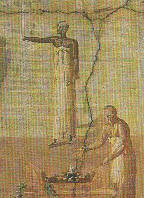Her long thick hair fell in tapering
ringlets on her lovely neck, and was crowned with an intricate chaplet in which was woven
every kind of flower. Just above her brow shone a round disc, like a mirror, or like the
bright face of the moon, which told me who she was. Vipers rising from the left-hand and
right-hand partings of her hair supported this disc, with cars of corn bristling beside
them. Her many-colored robe was of finest linen; part was glistening white, part
crocus-yellow, part glowing red and along the entire hem a woven bordure of flowers and
fruit clung swaying in the breeze. But what aught and held my eye more than anything else
was the deep black luster of her mantle. She wore it slung across her body from the right
hip to the left shoulder, where it was caught in a knot resembling the boss of a shield;
but part of it hung in innumerable folds, the tasseled fringe quivering. It was
embroidered with glittering stars on the hem and everywhere else, and in the middle beamed
a full and fiery moon.
In her right hand she held a bronze rattle, of the sort used to frighten away the God of
the Sirocco; its narrow rim was curved like a sword-kit and three little rods, which sang
shrilly when she shook the handle, passed horizontally through it. A boat-shaped gold dish
hung from her left hand, and along the upper surface of the handle writhed an asp witch
pulled throat and head raised ready to strike. On her divine feet were slippers of palm
leaves, the emblem of victory.
All the perfumes of Arabia floated into my nostrils as the Goddess deigned to address
me: ‘You see me here, Lucius, in answer to your prayer. I am Nature, the universal
Mother, mistress of all the elements, primordial child of time, sovereign of all things
spiritual, queen of the dead, queen also of the immortals, the single manifestation of all
gods and goddesses that are.
My nod governs the shining heights of Heaven, the wholesome sea-breezes the lamentable
silences of the world below. Though I am worshipped in many aspects, known by countless
names, and propitiated with all manner of different rites, yet the whole round earth
venerates me.
The primeval Phrygians call me Pessinuntica, Mother of the gods; the Athenians, sprung
from their own soil, call me Cecropian Artemis; for the islanders of Cyprus I am Paphian
Aphrodite; for the archers of Crete I am Dictynna; for the trilingual Sicilians, Stygian
Proserpine; and for the Eleusinians their ancient Mother of the Corn.
‘Some know me as Juno, some as Bellona of the Battles; others as Hecate, others again
as Rhamnubia, but both races of Ethiopians, whose lands the morning sun first shines upon,
and the Egyptians who excel in ancient learning and worship me with ceremonies proper to
my godhead, call me by my true name, namely, Queen Isis. I have come in pity of your
plight, I have come to favor and aid you. Weep no more, lament no longer; the hour of
deliverance, shone over by my watchful light, is at hand.
‘Listen attentively to my orders.
‘The eternal laws of religion devote to my worship the day born from this night.
Tomorrow my priests offer me the first-fruits of the new sailing season by dedicating a
ship to me: for at this season the storms of winter lose their force, the leaping waves
subside and the sea becomes navigable once more. You must wait for this sacred ceremony,
with a mind that is neither anxious for the future nor clouded with profane thoughts; and
I shall order the High Priest to carry a garland of roses in my procession, tied to the
rattle which he carries in his right hand.
Do not hesitate, push the crowd aside, join the procession with confidence in my grace.
Then come close up to the High Priest as if you wished to kiss his hand, gently pluck the
roses with your mouth and you will immediately slough off the hide of what has always been
for me the most hateful beast in the universe.
‘Above all, have faith: do not think that my commands are hard to obey. For at this
very moment, while I am speaking to you here, I am also giving complementary instructions
to my sleeping High Priest; and tomorrow, at my commandment, the dense crowds of people
will make way for you. I promise you that in the joy and laughter of the festival nobody
will either view your ugly shape with abhorrence or dare to put a sinister interpretation
on your sudden return to human shape. Only remember, and keep these words of mine locked
tight in your heart, that from now onwards until the very last day of your life you are
dedicated to my service. It is only right that you should devote your whole life to the
Goddess who makes you a man again. Under my protection you will be happy and famous, and
when at the destined end of your life you descend to the land of ghosts, there too in the
subterrene hemisphere you shall have frequent occasion to adore me. From the Elysian
fields you will see me as queen of the profound Stygian realm, shining through the
darkness of Acheron with a light as kindly and tender as I show you now.
Further, if you are found to deserve my divine protection by careful obedience to the
ordinances of my religion and by perfect chastity, you will become aware that I, and I
alone, have power to prolong your life beyond the limits appointed by destiny.’
With this, the vision of the invincible Goddess faded and dissolved.
Translated by Robert Graves, The Golden Ass (New York, 1951). Slightly altered.
|
